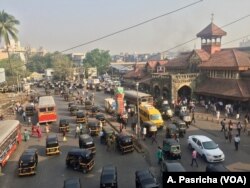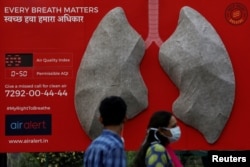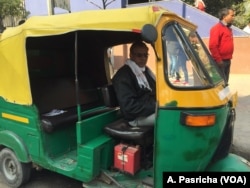They are being called pollution migrants — a growing band of residents in the Indian capital who are relocating to other places as its toxic air sparks grim warnings that it is extracting a heavy toll on the city's health. But environmental experts question whether they have many choices, pointing out that much of urban India is grappling with an air pollution crisis.
Last year, when Purva Bhatia's three month-old-daughter became sick with pneumonia, the doctor attributed it to New Delhi's deadly air pollution. The thought of leaving the city where she and her husband grew up had never crossed their minds. But having watched many other children battle respiratory ailments, it did not take long for them to decide that they could not raise her in Delhi.
"We needed to give her clean air at least. Just to see that three month old with nebulizer and medicines, that was really traumatizing," recalls Bhatia, who writes a blog. She migrated to Canada last month.
Toxic air
In recent years, air pollution in the Indian capital a mix of automobile emissions, construction dust and industrial emissions — often reaches severe levels in winter months. Although summer is better, the air quality is still poor and New Delhi, which now ranks as the world's most polluted mega city.
Doctors warn that the toxic air, which is considered to be equivalent to smoking 20 cigarettes a day when it is at its worst, can lead to serious respiratory and heart ailments.
Those scary warnings are prompting some to pack their bags. Some have gone to southern cities like Bengaluru and Chennai, while others have headed to the western city of Goa, a palm-fringed, beach destination.
Aditi Malhotra, an event planner, left for Goa a year and a half ago after she suffered from breathing problems and eye infections due to the toxic air in her hometown, Delhi. "It was getting very difficult to handle all of that. It was a very conscious and planned decision to move to a cleaner place," she said.
'National emergency'
However, Anumita Roy Chowdhury at New Delhi's Center of Science and Environment, warns that "we cannot really run away." Calling air pollution a "national emergency" she points out that while the Indian capital may have grabbed the headlines, the air in most other cities is also toxic.
"We know that almost 88 percent of the cities that are monitored in this country are what is officially classified as critically polluted," she says. "It is as expansive as that."
'Public health emergency' and relocation
India dominates the list of the world's most polluted cities — according to the World Health Organization, 14 out of the 20 top ones are in India.
Shruti Chaturvedi, a 25-year-old who has launched a startup, Chaaipani, testifies to that problem. She moved to Delhi in 2016 but after her bronchitis worsened, she quit the city. The reason: "I had breathing troubles, I could not even sleep at night, I had to buy air purifiers, and that is the worst, to even ask for good air," she said.
Chaturvedi moved to Mumbai, but although the air was cleaner than in Delhi, she still found it difficult to handle the pollution levels. She is now heading to Goa and this time she is taking no chances. "Even when I am looking for houses in Goa, I go around taking the air pollution meter to see where air pollution is the least," she said.
Many are searching for options. Several young professionals told VOA they are willing to take pay cuts and relocate to cleaner places with most wanting to move for the sake of their children.
"You can take a risk with your own health, but you can't do it with your kids," said a young lawyer with a two-year-old son who did not want to be named.
Doctors say that the numbers of wheezing men, women and children who stream in for help rises every winter and call the city's toxic air the prime contributor.
"Most hospitals are now reporting much higher percentage of patients having respiratory diseases as compared to ten years back," according to Doctor Arvind Kumar, a prominent lung surgeon in the city. "And now it is being realized that the worst affect is coming in children in the form of suboptimal brain and lung development. For me it is a public health emergency, it is much bigger than any development agenda."
However, in a city of over 20 million, the option of moving out is still restricted to the upper middle classes and the elite. Many of the worst affected, such as those working outdoors in pavement stalls and auto rickshaw drivers, say they have no choice but to stay in the city.
"I get headaches, burning in my eyes, when I drive, especially in winter," says 47-year-old Ashok Lohia, an auto rickshaw driver. But he shrugs aside his health issues, "I have to earn a living. I am not educated, where can I go?"
Those who have quit Delhi admit uprooting themselves was not easy, but say they have no plans to turn back until the city's air pollution crisis eases.









